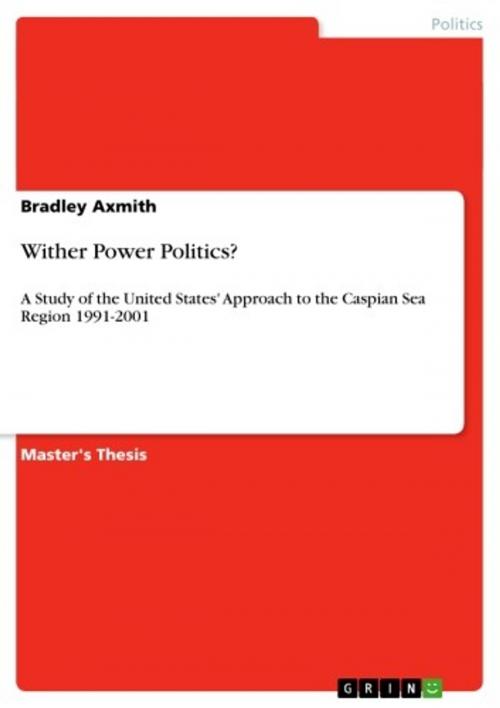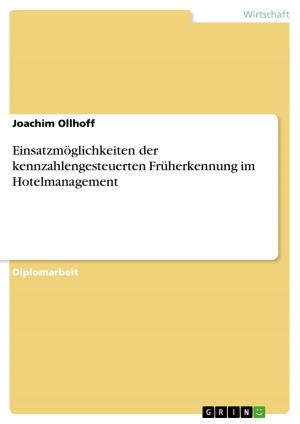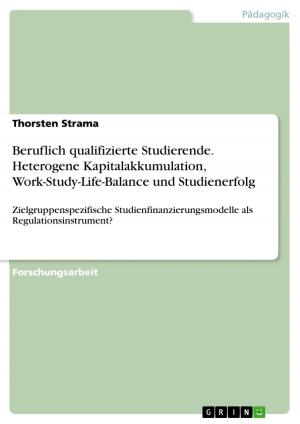Wither Power Politics?
A Study of the United States' Approach to the Caspian Sea Region 1991-2001
Nonfiction, Social & Cultural Studies, Political Science, International, International Security| Author: | Bradley Axmith | ISBN: | 9783656343165 |
| Publisher: | GRIN Verlag | Publication: | January 2, 2013 |
| Imprint: | GRIN Verlag | Language: | English |
| Author: | Bradley Axmith |
| ISBN: | 9783656343165 |
| Publisher: | GRIN Verlag |
| Publication: | January 2, 2013 |
| Imprint: | GRIN Verlag |
| Language: | English |
Master's Thesis from the year 2009 in the subject Politics - International Politics - Topic: Peace and Conflict Studies, Security, , course: US Foreign Policy, International Relations in the Caspian Sea Region, language: English, abstract: The New Great Game in the Caspian Sea Region received moderate attention from scholars following the collapse of the Soviet Union because it resembled the continuation of rivalry between Washington and Moscow. For the eight Caspian republics, the discovery of vast oil and gas deposits was the key to securing the newly independent states' sovereignty away from Moscow's control toward integration with Europe and the United States. This thesis analyses the US' treatment of the Caspian Sea Region between 1991 and 2001, in order to measure whether its policies were crafted according to Realist tenets in formulating policy designed to advance its security. The historical record seen through Offensive Realism presents evidence that US foreign policy was governed by principles not balance of power considerations, led by the false notion that democratic Russia would act in accordance with US goals. Intent on fostering democracy in Russia the United States denied the competitive nature of international politics, refusing to criticize abuses by Moscow in the region and failing to intervene when US interests were marginalised. The US failed to prevent Russia from refashioning conditions conducive to the reabsorption of the Caucasus and Central Asia as a sphere of influence; nor did it account for China's expanded role and trajectory as a challenge to US power. This analysis shows, for example, that Russia's proximity and willingness to use force exceeded the capabilities of the US' use of its global predominance to shape regional events.
Master's Thesis from the year 2009 in the subject Politics - International Politics - Topic: Peace and Conflict Studies, Security, , course: US Foreign Policy, International Relations in the Caspian Sea Region, language: English, abstract: The New Great Game in the Caspian Sea Region received moderate attention from scholars following the collapse of the Soviet Union because it resembled the continuation of rivalry between Washington and Moscow. For the eight Caspian republics, the discovery of vast oil and gas deposits was the key to securing the newly independent states' sovereignty away from Moscow's control toward integration with Europe and the United States. This thesis analyses the US' treatment of the Caspian Sea Region between 1991 and 2001, in order to measure whether its policies were crafted according to Realist tenets in formulating policy designed to advance its security. The historical record seen through Offensive Realism presents evidence that US foreign policy was governed by principles not balance of power considerations, led by the false notion that democratic Russia would act in accordance with US goals. Intent on fostering democracy in Russia the United States denied the competitive nature of international politics, refusing to criticize abuses by Moscow in the region and failing to intervene when US interests were marginalised. The US failed to prevent Russia from refashioning conditions conducive to the reabsorption of the Caucasus and Central Asia as a sphere of influence; nor did it account for China's expanded role and trajectory as a challenge to US power. This analysis shows, for example, that Russia's proximity and willingness to use force exceeded the capabilities of the US' use of its global predominance to shape regional events.















